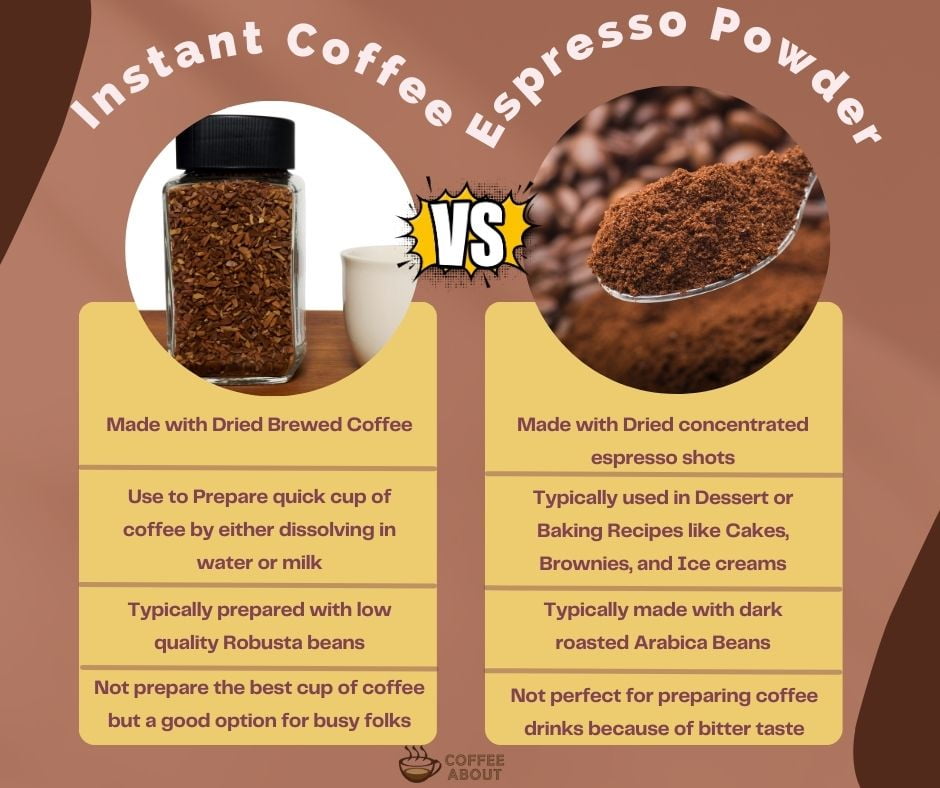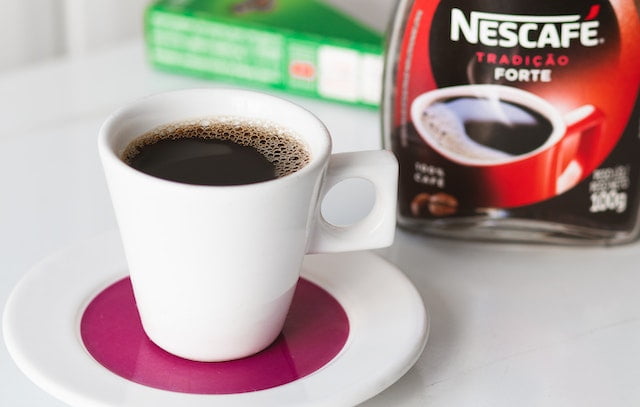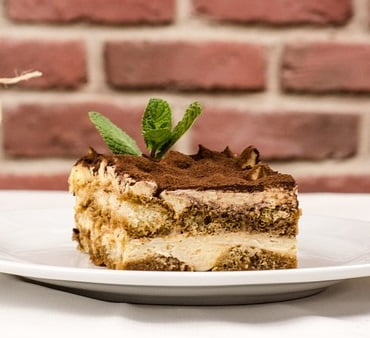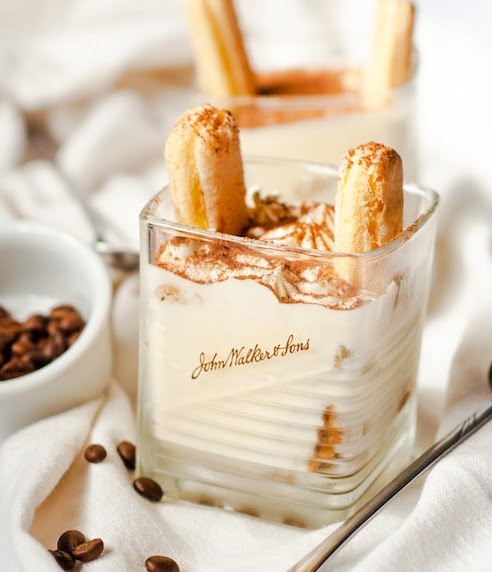Espresso powder and instant coffee, while similar in their instant nature, aren’t quite the same. The main difference is Espresso powder is typically used for baking or cooking, as it adds a rich flavor to recipes. While instant coffee is a convenient option for making a quick cup of coffee as it dissolves quickly in hot water.
With endless instant coffee options lining store shelves, you may have seen small jars labeled espresso powder pop up too. These instant granules promise intensified flavor for recipes and drinks.
In this breakdown, I’ll explain how espresso powder and instant coffee vary in processing methods, flavor profiles, brewed texture, ideal uses, and more.

What is Espresso powder, and how is it made?
Espresso powder is a popular ingredient in baking and cooking, as it can add a rich, deep coffee flavor to cakes, brownies, sauces, and other dishes.
Espresso powder is made by roasting coffee beans until they reach a dark roast, then grinding them into a fine consistency. Next, the grounds are brewed into concentrated shots of coffee like Espresso. This brewed coffee is then dehydrated to yield a fine powder that can be used to refine the flavor of recipes or added as an ingredient in various sweet dishes.
“Espresso Powder has the same bold, bittersweet flavor as chocolate, So adding it to recipes that are chocolate-forward will punctuate the flavor of the cocoa and kick it up a notch.”
Martha Stewart
Can you Drink Espresso Powder?
Espresso powder is not the best choice for preparing coffee drinks as it will produce a bitter drink without any complex coffee flavors. It is best suited for baking purposes.
Even though you can technically dissolve it in water for drinking, espresso powder is really not for ideal for your morning latte. It is primarily used by bakers for flavoring cookies, cakes, and more.
Thekitchn
While Espresso powder isn’t ideal for black coffee drinks you can certainly use it in Mochas, delicious coffee smoothies, and iced coffee drinks.
What is Instant coffee, and how is it made?
Instant coffee is made by brewing regular coffee and then drying the liquid brewed coffee through either freeze-drying or spray-drying. This process results in a powder that can be easily dissolved in hot water to make an effortless cup of coffee.
Instant coffee is a convenient option for coffee drinkers who want a quick and easy cup of coffee without the need for a coffee maker or coffee grounds.
The quality of instant coffee varies depending on the quality of the coffee beans used, the brewing process, and the drying method.
Some brands of instant coffee use high-quality beans and carefully control the production process to create a product that closely resembles freshly brewed coffee.
Other brands use lower-quality beans to cut costs, resulting in a product that has a weaker or less desirable taste.
According to express.co.uk: “Instant coffee accounts for 13 percent of all coffee drunk worldwide and Most instant coffee is made from Robusta beans grown in Vietnam”.
Nescafe is the top brand in the Instant coffee industry and popularized this convenient coffee in 1938 for busy coffee lovers.

Instant Coffee Vs Espresso | The Differences
There are two options for quick coffee: instant coffee and powdered espresso. Here are some differences between the two
Taste flavor and aroma
Instant coffee is not known for its great taste compared to freshly brewed coffee. Generally, instant coffee has a more bitter taste with a slightly acidic and roasted flavor.
Despite its lower quality, instant coffee is popular in busy places like offices and among people who want to drink coffee on the go because it is a convenient and quick way to make a reasonable cup of coffee.
On the other hand, the espresso powder doesn’t taste good either in coffee drinks. It has a very strong and concentrated coffee flavor that is more suited for flavoring and baking purposes.
The Caffeine Content
Espresso powder typically has a higher caffeine content than instant coffee, as it is made from concentrated coffee that has been dried and ground into a powder.
The exact amount of caffeine in espresso powder can vary depending on the brand and type, but it generally contains about 60-80 milligrams of caffeine per teaspoon.
Instant coffee, on the other hand, has a lower caffeine content than espresso powder. The amount of caffeine in instant coffee is about 30-60 milligrams of caffeine per teaspoon.
Coffee Beans
Instant coffee is famous among those who want a quick drink without spending too much money on coffee. That is why it’s typically made from Robusta beans, cheaper than Arabica beans.
Robusta beans also contain more caffeine, which gives instant coffee its characteristic strong, bitter taste.
However, some instant coffees also contain a blend of both Robusta and Arabica beans for a more balanced flavor profile.
In Contrast, Espresso powder is typically made from darkly roasted coffee beans, which are either Arabica or a blend of Arabica and Robusta beans.
Espresso powder is typically used for baking
Espresso powder is a versatile ingredient that can be used in a variety of desserts to add a rich, deep coffee flavor. Here are some simple use cases for espresso powder in baking:
- Chocolate desserts: Espresso powder is commonly used in chocolate-based desserts, such as brownies, cakes, and cookies, to enhance the flavor of the chocolate. The strong, bitter notes of the espresso powder help balance the sweetness of the chocolate and create a more complex flavor profile.
- Tiramisu: Tiramisu is a classic Italian dessert that consists of layers of ladyfingers (sponge-like biscuits), soaked in Espresso and liqueur, and a creamy filling made with mascarpone cheese, sugar, and eggs.
- Cakes: Espresso powder is a popular ingredient in many cake recipes. It has a deep coffee flavor that pairs well with the flavors of chocolate, caramel, and other rich ingredients commonly used in cakes.
- Ice Creams: Some popular ice cream recipes that use espresso powder include coffee ice cream, chocolate espresso ice cream, and Vanilla ice cream.
- Rubs and marinades: Espresso powder can be a great addition to rubs and marinades for meat dishes, especially beef, and pork. Espresso powder has a rich, deep coffee flavor that pairs well with the flavors of grilled or roasted meat.


Final thoughts
And that’s the Espresso Powder vs Instant Coffee showdown in a nutshell. Whether you seek a quick coffee fix or delicious coffee desserts, both have their unique use cases.
Got any other substitution tips for using espresso powder or instant in recipes? Let me know in the comments! I’d love to hear your favorite desserts, drinks, and clever uses for these coffee granules
You’ll love to read interesting Guides:
- How to make Coffee from Beans
- How to make the coffee stronger
- What is Kopi Luwak Coffee
- Can you eat Coffee Beans
- Whole Beans vs Ground Coffee
FAQs
Can You substitute instant coffee for espresso powder?
Yes, you can substitute instant coffee for espresso powder in most recipes. However, it’s important to note that Espresso powder is typically stronger than instant coffee.
So, if you’re using instant coffee as a substitute for espresso powder, you have to use a little more Instant coffee to achieve the desired flavor in your recipe.
Is espresso powder stronger than instant?
Yes, espresso powder is generally stronger than instant coffee in flavor and caffeine content. Espresso powder is made from strong dark roasted beans, resulting in more intense flavors.
are instant espresso and espresso powder the same
Yes, Instant Espresso and Espresso powder are the exactly same thing. Companies may use the terms “instant espresso” and “espresso powder” interchangeably to refer to the same product, which is a fine powder made from dehydrated espresso shot.
Can You Make Espresso with Instant Coffee?
No, you cannot prepare rich and dense espresso shots with a thick layer of Crema using instant coffee powder. However, you can make espresso-like coffee by increasing the coffee-to-water ratio.
Here’s a detailed guide on making Espresso with instant coffee



